COVER- Schoolhouse rocked: Debate rumbles on Montessori's mountain
Published March 9, 2006 in issue 0510 of the HooK.
By COURTENEY STUART [email protected]
Silhouetted figures of children cartwheel across the campus, but what's going on inside a local school high atop Pantops Mountain has some parents flipping out-- and pulling their children out.
In an open letter signed by 11 families that began circulating by email in mid-February, the former chair of the Montessori Community School board enumerates "reduced emphasis on basic academics," "overcrowded, chaotic, and unsafe classrooms not conducive to learning," as well as "false, deceptive, and/or incomplete communications to parents on critical issues."
The former chair, Jon Rintels, who recently withdrew his child from the school, portrays one class as so large that students are split into separate rooms with only one teacher available to shuttle between them. Besides describing an administration out of touch with the realities of the classroom, Rintels also suggests a board too preoccupied with personal projects to properly search for the institution's new leader last fall.
Within hours of this reporter contacting the school, the Hook received nearly a dozen heartfelt letters from parents in support of the Montessori Community School. Many of these parents downplay the exodus, portray Rintels as "vindictive," and claim the school has actually improved this year under its new leadership.
"I observed a magical, wonderful, warm community of people genuinely interested in helping the students there develop into the best people they could be," writes Alyssa Hart, whose daughter is in her second year in the school's Primary class.
Are the concerned parents' allegations founded, or is this heated situation-- as more than one pro-administration parent suggests-- a case where a few people can't tolerate change?
At the heart of the conflict is the so-called Montessori method, a century-old teaching technique based on some unusual-- even controversial-- measures.
A school on a hill
Perched on the peak of Pantops Mountain, Montessori Community School occupies six acres and offers 360-degree views of the Blue Ridge, Brown's Mountain, and Charlottesville. The large brick house, visible from Route 250, fronts a bucolic, almost farm-like setting nestled on the slope behind the house.
Several low-slung modular buildings frame a courtyard festooned with swings, gardens, and birdfeeders. (Montessori Community School is one of a handful of schools nationwide that have achieved status as a National Audubon Bird Sanctuary.) A low fence with several gates completes the enclosure.
On a recent sunny afternoon at the school, children participate in a variety of Montessori-approved activities. In a large green aluminum-sided building housing a spacious gymnasium, at least 20 children ages 6-to-9-- the Lower Elementary class-- sit on mats, their eyes focused on an instructor teaching them a chanting song through call and response.
In another classroom, students in the Upper Elementary class sprawl on the floor, listening quietly as a teacher reads a story. These activities could be happening at any school, but on closer inspection there are clues that these rooms are different from more traditional educational settings.
For starters, there's just one class for every three years' of conventional schools. Children are encouraged to teach each other, and they call their adult teachers by their first names. Even the 3-to-6 year olds in the Primary class can enter and leave their classroom at will.
These traditions, say school officials, were developed by Maria Montessori, one of Italy's first female physicians, who developed the unique approach called "follow the child."
Montessori's method
Maria Montessori's educational theories were born of her clinical observation that children learn best when they're actively engaged in the learning process rather than passively listening to an instructor, according to the website of the Association Montessori Internationale (AMI).
In 1906, Montessori founded Casa dei Bambini, or "Children's House," for approximately 60 children of poor families living in the San Lorenzo district of Rome. By 1909, according to AMI (the organization Montessori founded in 1929), Montessori offered her first seminar based on her success with her students. Teachers from around the world attended, and over the next several decades, her teaching methods-- and materials-- sprang up in schools around the world.
Today, in addition to Montessori Community-- which opened in 1982-- Charlottesville is home to four Montessori schools with a total enrollment of several hundred children, most of them pre-school age.
Starting at the youngest age-- 18 months at Montessori Community-- children are allowed to choose their own activities and to remain engaged in them until their attention naturally wanes. Teachers are thought of as "guides," helping as the children teach themselves-- and each other.
In an ideal setting, this tradition of "freedom with responsibility" creates calm children who are independent, caring, respectful, and who have been taught a deep love of learning, says the new head of the Montessori Community School, Wendy Fisher.
But to Rintels and others whose comments populate the "Concerned Parents" website, what the school delivered following Fisher's hiring this year was anything but calm and responsible.
Chaos in the classroom
How many kids are too many? That's a question Rintels asks in his letter and on the website http://concernedmcsparents.blogspot.com. He and others say they were surprised to learn at the beginning of the school year that a new teacher had been put in charge of the Upper Elementary classroom-- with no assistant.
That meant one teacher had to deal with 32 students spread over two classrooms-- and that meant that 9-to-12-year-olds were often on their own.
While some parents were asked to come in and help teach "specials" such as music and foreign language, Rintels and others say that children in one of the two rooms were often left unattended. A so-called "quiet room," Rintels writes, became more like a "riot room."
Rintels reported that the situation became so chaotic that some children did not want to get out of the car in the morning.
In a letter sent to the board and linked to the website, one mother reported that her son in the Upper Elementary class cried in the car on the way to school and pleaded to go to a different school.
Rintels alleges that the Upper Elementary class-- with 32 students generating up to $8,000 each in tuition-- is a huge profit center for the school and as such warranted a full-time assistant.
Fisher says she listened to parents' concerns, and that she did respond to their requests. She placed an assistant in that class each morning, she says. But she insists that the original structure of the classwith one lead teacher-- was and is in keeping with official Montessori methods.
While the City of Charlottesville proudly notes that its K-4 classrooms average just 17 students each, the Montessori method allows much larger groupings.
The American Montessori Society recommends a maximum of 30 students per lead teacher, but the other governing body, the Association Montessori Internationale, confirms that class sizes of up to 45 students with a single guide are acceptable, even desirable, for Upper Elementary classes.
"That should not be a complaint," says Virginia McHugh, executive director of AMI. "The children have learned responsibility and independence if they have come up through the system." Too many "guides" can be meddlesome, she says, and can interfere with the natural learning process.
UVA professor and Montessori expert Angeline Lillard, author of Montessori: the Science behind the Genius, agrees that class sizes of between 30 and 45 are ideal for authentic Montessori schools. Montessori children, Lillard says, "are so responsible on their own, and they just behave well."
Another complaint about the Upper Elementary class concerned its teacher's training. Rintels and others say Fisher misrepresented the new instructor's qualifications by claiming she was Montessori-certified. In fact, the teacher had completed her Montessori coursework, but her "practicum" year as lead teacher in the class at Montessori Community was the final step before receiving AMS certification.
In a letter sent to parents on September 27, 2005, Fisher responded to the allegations that she had misrepresented the truth about the teacher's credentials. The confusion, she said, stemmed from differences in the certification procedures between AMS-- which offers certification following the practicum year-- and AMI, which offers certification before the practicum year.
Rintels was dissatisfied with Fisher's explanation.
It takes at least one year for certification from either organization, he wrote, and the new teacher had not begun her training until June 2005.
"Remember the old adage that 'Lies are like cockroaches; uncover one and others are bound to show up'?" wrote Rintels. "I think another cockroach just showed up."
Fisher stands by her letter, and declines comment on Rintels' accusations, saying only, "Originally, when I introduced her, I said she was trained." She reiterates the standard Montessori practice of someone in their practicum year serving as a supervised lead teacher. Fisher says she provided regular supervision.
"I expected people to be fine with that," she says.
Hiring practices
Fisher is not the only one bearing the brunt of the Concerned Parents' ire. Rintels says the school's board of directors, now composed of 11 members, abdicated its responsibility by, among other things, appointing Fisher head of school in January without conducting a search.
Fisher, who'd served as the school's director of education during the 2004-05 school year, was appointed interim head last fall. No search was conducted, and two months ago her appointment was made permanent.
"It may be an exaggeration to say that the Board's cancellation of the promised search is the nonprofit world's equivalent of an anti-democratic coup d'etat, but not much," wrote Rintels, suggesting Board members may have had other things on their minds such as building their dream house or traveling to Europe.
Board chair David Cathcart calls such accusations unfounded. "Quotes were taken out of context," he says.
Cathcart says the board's decision to hire Fisher was based on one thing: "She has the expertise." Moreover, he notes, Fisher "has very many supporters."
Among them are Montessori Community School parents Michael and Jennifer Clark, who write that Fisher has improved the school in numerous ways.
"Wendy is an intelligent, well-educated woman with a deep understanding of the Montessori method and a commitment to assisting our school in moving successfully into the future," the parents of two claim in an email sent to the Hook.
Fisher also bristles at questions of her qualifications-- and questions of the process by which she was hired.
The Concerned Parents, she says, "aren't familiar with how difficult it was to get me in the first place."
The Board originally brought Fisher to the school two years ago as a consultant, and then hired her-- after a national search-- as the director of education for the 2004-2005 school year.
"I'm triple trained," says Fisher, explaining she is certified by AMI for ages 3-6, 6-12, and middle school.
Furthermore, say Fisher and Cathcart, nothing in the bylaws requires the board to do a broad search-- as is the case in public schools, which must advertise every position before hiring.
Follow the childout the door?
In addition to concerns about the Upper Elementary classroom, some parents have questioned the school's policy of allowing children particularly the very young-- to go outside alone.
Allison Bell's daughter, Schuyler, attended Montessori Community school last year-- until her babysitter, who was picking the girl up one afternoon, reported finding the four-year-old alone on the playground with a gate open.
When Bell called to complain, she says, Fisher told her that Montessori allows children to "earn the right" to be alone on the playground and that "We've never had a child go missing."
Another mother, who asks that her name not be used, says she too decided to remove her child from the school after finding him alone and unsupervised on the playground.
"That was pretty much the last straw for me," says the mother.
AMI's McHugh says the notion of an indoor/outdoor classroom where children can explore freely is essential to an authentic Montessori experience, as long as the children are within sight and sound of a teacher. "We put safety first," she says.
Fisher says a teacher is always within sight and sound of the children at Montessori Community.
In addition, she says, "They are gated in. And if they misuse the privilege, they lose it."
That answer didn't calm Bell's fears. A gate might keep a child in, she says, but it won't keep a stranger out.
"There are some things that might have been appropriate for 19th century Italy that are not appropriate for 21st century Charlottesville," she says.
Painful policy
For several parents, the decision to remove a child from the school was greeted by a painful surprise: their other children would not be invited back. For the parents, the policy meant finding another school. For the children, it meant a change of venue and uprooting friendships.
"Could anything be less 'follow the child' than this policy?" asks one person writing on the Concerned Parents blog.
Despite a six-year history with the school-- including stints on the board and chairing school fundraisers-- outspoken parent Barret Stump and her husband questioned the policy.
"What if one of my children needs something different from what MCS has to offer, but the other is doing well in that learning environment?" she asks in a letter to the Montessori board and linked on the blog.
Stump claims she knows of as many as 22 children who won't be coming back and that the school could be hurting itself with its three-year policy.
The Stumps pulled their two children out in February after learning they would not be offered re-enrollment contracts for next year-- because of their questioning, she believes.
Fisher says the three-year policy has always existed, though she agrees that the school may not have enforced it in the past. And while it may seem unfair, both Fisher and McHugh say it is standard Montessori procedure.
Because the Montessori method relies heavily on three-year cycles, the schools want families who understand and take the multi-year commitment seriously, says McHugh.
Fisher says the policy applies only to families who remove their children before they've completed a three-year cycle.
"It's not in the child's best interest to move to another school after one year," she says.
That might explain the experience of Hunter and Andrea Davidson, who write on the website that their first-grade daughter is having trouble transferring to her grade level in another school because of her "non-existent" reading ability.
"She's two grade levels below her grade," the Davidsons allege.
Another parent who pulled her child out says her son, in the Lower Elementary school class, was "severely below in math and writing, particularly." Since moving to a different school, she says, "He's gotten 100 on his tests. It wasn't an aptitude issue."
But other parents say they are thrilled with the progress their children are making at Montessori Community School.
"My four-year-old son is practically reading as a direct result of attending this school," writes Celina Mills. "We are thrilled with his progress both socially and academically... MCS is empowering him to learn!"
Because children learn at different paces, Fisher says, the school doesn't guarantee that they will have learned everything that corresponds to a grade until the three-year cycle is done. For instance, one six-year-old might spend a year focused heavily on math and spend less time reading. Fisher says the Montessori teacher will make sure he catches up on all skills by the end of the cycle, but if he leaves before the cycle ends, he may test below grade level in a traditional education setting.
Fisher declines comment on any particular student, but says she believes the majority of children at Montessori Community end up ahead of their public school peers-- if they stay with Montessori.
Looking forward
For the parents who have already left the Montessori Community School, there may be no going back. Andrea Davidson resigned her seat on the board in October and withdrew her daughter.
"I would love to bring my youngest son to MCS in the near future," Davidson laments. "However, I do not have faith in the administration or the board to make good decisions about MCS, the future of the school, or the education of my children. The current head of school and board leadership lack integrity to follow the proper course."
The litany of accusations from the Concerned Parents has fed an allegation among some parents loyal to the school that the continued complaints-- even by parents who have sent their children elsewhere-- are "vindictive."
But that's not how Kurt and Ilsa Illig say they feel. "We are private people," they write on the website. "We did not want to post our concerns in a public forum. Our motivation in coming forward is to do the right thing, in the hope that the community that we loved but were forced to leave can come together to honestly and openly resolve these problems."
And Rintels, who declined comment beyond his online statements, expresses hope that the school will address his concerns, despite the fact that his children will no longer attend.
"Our hope," Rintels writes, "is that by openly bringing these serious concerns to the attention of the entire [Montessori] Community, it can then openly discuss them, and reverse the School's downward spiral before it's too late."
Both Cathcart and Fisher say they have encouraged families to come forward with concerns or complaints and are disappointed that they have been unable to satisfy the Concerned Parents.
"One of the hallmarks of Montessori is grace and courtesy," says Fisher. "That makes this situation somewhat more heartbreaking. Our children do live by this grace and courtesy; I wish the adults could also."
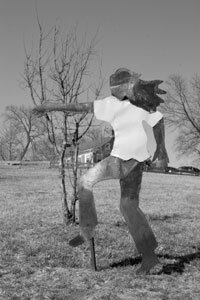
PHOTO BY JEN FARIELLO
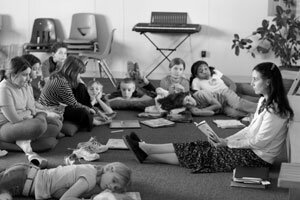
An Upper Elementary school teacher reads to her class at the Montessori Community School.
PHOTO BY JEN FARIELLO
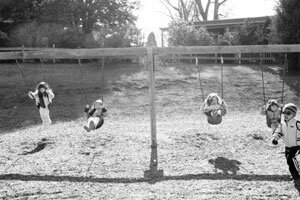
Children swing in a fenced courtyard.
PHOTO BY JEN FARIELLO >
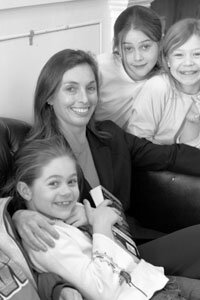
Montessori Community School's new head of school, Wendy Fisher, with several students.
PHOTO BY JEN FARIELLO
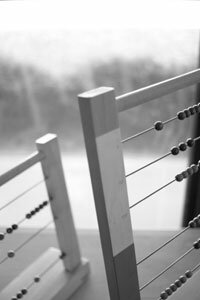
A counting device called an abacus is used for teaching some Montessori math.
PHOTO BY JEN FARIELLO #
|